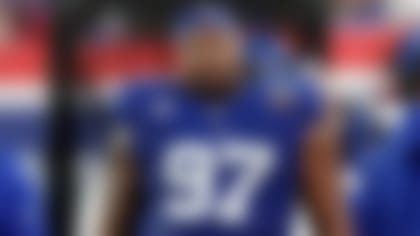Former NFL player and scout Bucky Brooks knows the ins and outs of this league, providing keen insight in his notebook. Today's installment covers:
But first, a look at two title contenders hiding in plain sight ...
As we hit the stretch run of the 2024 NFL regular season, much of the playoff field has already crystallized. So, inevitably, there is plenty of discussion about which teams could actually come out of the postseason tournament on top. Who are the true Super Bowl contenders?
Obviously, the Chiefs remain squarely in the mix as back-to-back reigning champs. Despite a lack of overwhelming dominance, Kansas City still sits at 11-1 after all. The Bills and Ravens are also right in the discussion on the AFC side, fueled by the dynamic performances of their MVP-caliber quarterbacks. Meanwhile, the popular NFC narrative is that the Lions and Eagles are on a Championship Sunday collision course, boasting the league's two longest active winning streaks.
All that said, I feel like two impressive squads continue to get short shrift. Pittsburgh and Minnesota deserve far more respect as absolute contenders in each of their respective conferences. After spending the past few days studying the game tape, I'm here to explain why the Steelers and Vikings could end up winning Super Bowl LIX. Here are three reasons why each team is a legit threat to hoist the Lombardi Trophy in February.
1) Defense wins championships
Despite high-scoring offenses' entertainment value, the teams that nab rings often hang their hats on defensive dominance. Just look at Kansas City's latest title run this past season.
The Steelers rank among the top 10 in total defense (sixth, 311.0 yards per game), scoring defense (tied for sixth, 18.7 points per game), rushing yards allowed (fourth, 90.5 yards per game) and takeaways (first, 25), with a collection of big-play defenders creating chaos for opponents. Led by former Defensive Player of the Year T.J. Watt, the Steelers beat opponents into submission with a disruptive front bolstered by the contributions of Cam Heyward, Nick Herbig and Alex Highsmith. The quartet's relentless energy and physicality set the tone for a defense that relishes the chance to bully opponents at every turn.
Moreover, persistent pressure forces opposing quarterbacks to make errant throws against a ball-hawking secondary loaded with playmakers. As defensive coordinator Teryl Austin mixes in man and zone looks to keep QBs guessing, the Steelers have feasted on tipped and overthrown passes thrown into congested areas. With Joey Porter Jr., Beanie Bishop Jr., Donte Jackson, Minkah Fitzpatrick, DeShon Elliott and Damontae Kazee circling like vultures, the quarterback must pause before attempting hero throws against a secondary obsessed with picks (interceptions) and sticks (big hits).
2) Pittsburgh's ball-control offense is perfect for playoff football
Make no mistake about it: The game changes in the playoffs. The pressure of the single-elimination tournament leads to more conservative game plans from coaches who value possession and want to dictate tempo and flow.
Under offensive coordinator Arthur Smith's guidance, the Steelers have evolved into a ball-control offense with explosive elements. The savvy offensive architect has built around a rugged running game that ranks ninth in rushing yards per game (133.1) but second in attempts per game (33.5). The persistent approach has helped Pittsburgh lead the league in time of possession (32:42), forcing opponents who want to play fast-break ball into grind-it-out affairs. With fewer total possessions in the game, the Steelers' turnover prowess and superb ball security (plus-15 advantage in turnover differential) will put immense pressure on opponents to play near-perfect football to win in the pressure-cooker environment of the playoffs. While playing mistake-free football is always the goal, the knowledge that Pittsburgh likes to play keep-away creates in-game tension that can overwhelm opposing players and play callers.
Considering head coach Mike Tomlin's exquisite management skills and commitment to complementary football, the playoffs could create the perfect storm for a team built to play in the tournament.
3) Russell Wilson is the X-factor
Wilson's winning pedigree as a former Super Bowl champion was a significant factor in his signing with the team. The nine-time Pro Bowler has won on the biggest and brightest stage, and his poise will serve the Steelers well in the postseason.
The 13th-year pro has already flashed big-play potential and a clutch gene in guiding Pittsburgh to a 5-1 mark as a starter. Wilson has added the deep ball to an offense that lacked aerial explosiveness with Justin Fields under center. Though the younger signal-caller is a superior athlete and runner, the veteran's poise and pocket-passing prowess have unlocked George Pickens and Pat Freiermuth as perimeter playmakers. Moreover, Wilson has added more balance to the offense by increasing the team's general passing production (SEE: 148.1 more passing yards per game and 1.8 more yards per pass attempt) and overall passing efficiency (104.3 passer rating under Wilson, as compared to 93.3 under Fields).
With the offense suddenly capable of attacking overaggressive defenses intent on stopping the run with loaded boxes, the Steelers have become a far more formidable playoff opponent with Wilson under the center. The veteran's explosive playmaking ability and Super Bowl experience give Pittsburgh a chance to make its way to the winner's circle in February.

1) Kevin O'Connell and Brian Flores form a coaching dream team
The NFL is generally a player's league, with stars routinely determining which teams win or lose. That said, tactics and strategies take center stage in the postseason, with superior coaching deciding outcomes in a single-elimination tournament. With elite offensive and defensive strategists in place, the Vikings have a significant advantage. O'Connell (head coach/offensive play caller) and Flores (defensive coordinator) are exceptional game planners and play-callers, and their creative and imaginative schemes often confound opposing coordinators in crucial moments. And these gurus not only test the discipline of opponents' schemes but also consistently create big-play opportunities for Minnesota's best players.
Offensively, Justin Jefferson and Jordan Addison regularly post big numbers despite facing umbrella coverages with two deep safeties. In addition, Jefferson gets loose against double teams and bracket coverage through clever deployments that make it hard for opponents to maintain their leverage. By utilizing various motions, shifts and exotic formations, the Vikings find ways to get their all-world playmaker the ball despite facing myriad tactics designed to neutralize his impact.
Defensively, Flores is the master of deception, possessing a playbook loaded with unusual pre-snap alignments that change into various post-snap pressures and/or traditional coverages. With quarterbacks unable to crack the code before the snap, the bluff-and-bait tactics create a guessing game that few signal-callers have been able to win, going against the Vikings' veteran-laden defense.
In addition, Flores' unique schemes have helped Minnesota's impact players make game-changing plays. For instance, Jonathan Greenard (10), Andrew Van Ginkel (nine) and Pat Jones II (seven) have combined for 26 sacks despite opponents anticipating Cover 0-like pressures from the Vikings, based on their success utilizing the tactic in 2023. The defensive architect's thorough understanding of pass-protection schemes and route concepts has enabled Minnesota to adapt and adjust to maintain an advantage over opponents ill-equipped to deal with persistent pressure.
Given the importance of whiteboard wizards in the playoffs, the Vikings' coaching staff gives them a decided advantage over most foes.
2) Justin Jefferson and Co. can make Sam Darnold a star in the playoffs
O'Connell's exceptional scheming as a quarterback whisperer has helped Darnold play like an upper-echelon starter, but the Vikings' stellar supporting cast could make him a postseason star.
Jefferson and Addison are spectacular route runners with rare playmaking ability as catch-and-run specialists and vertical threats. They can score from anywhere on the field, but their ability to turn high-percentage passes into big plays makes them ideal weapons for a quarterback who struggled with accuracy before playing in Minnesota.
Furthermore, tight end T.J. Hockenson has re-emerged as a dominant playmaker between the hashes after shaking off the rust from a season-ending knee injury in 2023. The two-time Pro Bowler is settling back in as a chain mover, displaying soft hands and outstanding ball skills while accounting for 16 first downs on 23 receptions. As a big body (6-foot-5, 248 pounds) with the size and length to expand the strike zone, Hockenson is an easy target for Darnold on crucial downs.
While Aaron Jones flies under the radar as one of the catalysts for the running back renaissance, the veteran has amassed 1,111 scrimmage yards (820 rushing yards and 291 receiving yards) with five scores. His ability to find creases between the tackles has alleviated the pressure on Minnesota to rely solely on the aerial attack while also creating some big-play chances on play-action passes from various formations. Additionally, Jones' effectiveness on screens and swings has given the journeyman quarterback another option to target on high-percentage passes.
Considering how the Vikings' depth and talent challenges opponents at every turn, it is easy to see why Darnold is having a career year in Minnesota. If the supporting cast continues to dazzle on simplistic routes that a high-end high school quarterback could execute, Darnold could put on a Joe Flacco-like exhibition in the playoffs, leading to a blockbuster contract for a veteran who was once viewed as a major disappointment.
3) Minnesota's big-play defense can get it done
In a passing league where it is hard to play defense, the Vikings are the nightmare that keeps opposing quarterbacks and play callers up at night. Under the direction of an ultra-aggressive DC who pushes the envelope with exotic pressure schemes, Minnesota ranks near the top of the charts in sacks (39) and takeaways (24, including a league-best 18 interceptions). With negative plays coveted at premium, the Vikings' uncanny ability to put opponents behind the chains makes them a challenge to face in a single-elimination tourney. Though offensive coordinators have scoured the tape for almost two years attempting to crack the Vikings' defensive code, the ever-evolving scheme maximizes the experience and wisdom of a veteran group that has played a lot of games.
In the defensive backfield, in particular, the presence of Harrison Smith and Stephon Gilmore has enabled the Vikings to feature creative pre-snap disguises and unorthodox coverages from unique alignments. As a result, quarterbacks struggle to decipher the Vikings' intentions before the snap, leading to costly mistakes when the post-snap actions fool signal-callers. Given the relentless pressure the Vikings put on the quarterback via real and simulated blitzes, the creative tactics produce game-changing turnovers at inopportune moments.
Considering how negative plays (sacks, tackles for loss and turnovers) routinely determine winners and losers in the tournament, the Vikings' aggressive tactics could lead to purple and gold confetti falling from the sky in Super Bowl LIX.
What is wrong with Kansas City's D?
For most of this season, Kansas City's defense was viewed as the team's bedrock unit, keeping the Chiefs on track while the work-in-progress offense sorted itself out. Lately, though, Steve Spagnuolo's group has seriously struggled. The D gave up 30 points to Buffalo in K.C.'s lone loss of the season in Week 11, had issues against Bryce Young and the Panthers in Week 12 and allowed Aidan O’Connell to throw for 340 yards last week.
Whoa!
Perhaps we should've known the secondary would eventually miss the impact of L'Jarius Sneed, the star corner who led the team in passes defensed (14) and picks (two) last season, then was franchise-tagged and traded to the Titans. Sneed was a shutdown corner on the island with an aggressive playing style that made it challenging for pass catchers to find space outside the hashes. He never earned a Pro Bowl nod in his four seasons with the Chiefs, but opponents were certainly aware of the 6-foot-1, 192-pounder, who utilized his superior length and athleticism to disrupt the releases and route-running skills of premier wideouts.
Trent McDuffie, who snagged first-team All-Pro honors as the Chiefs' slot defender last season, was expected to on the perimeter after making the shift to a traditional corner role. But the third-year pro's performance has dipped, as reflected by his EPA when targeted, which jumped from minus-3.5 in 2023 to plus-1.7 this year, per Next Gen Stats. The move to the island has required him to showcase a different set of skills, a reminder that elite talent doesn't always immediately transfer from one position to the next. Don't get me wrong: McDuffie is still a fine young cover man, but the 24-year-old's still finding his footing as an outside corner in the NFL.
Moreover, the change took McDuffie out of the equation at the nickel -- a key role where he was truly great -- creating multiple holes in the secondary, thus weakening the defense overall. If McDuffie had stayed in the slot, his dominance there would have freed deep defenders to help elsewhere, enabling K.C. to replace Sneed outside with a lesser talent who could have been protected via tactics like bracket coverage or cloud coverage, with a half-field safety over the top.
The Chiefs also refrained from making a significant addition in the secondary. When CB Jaylen Watson suffered an injury in Week 7 that sent him to injured reserve, Kansas City's weakened defense was exposed. The secondary suddenly features three vulnerable spots (each outside cornerback position and the slot defender), with out-of-position players or replacements occupying key roles.
Nazeeh Johnson and Chamarri Conner have been inconsistent in coverage, leading to more completions and big gains against a defense that played at an elite level early in the season. Yes, the Chiefs could feature more conservative zone coverages to mask flaws and inexperience, but it's worth noting that heavy-pressure tactics helped key their back-to-back title runs.
With the offense still not explosive enough to win games on its own, Spagnuolo must fix the defensive backfield to ensure his vaunted Cover 0 tactics remain a staple on the call sheet. Given Spags' long track record of success in tweaking play calls to minimize his players' deficiencies, I expect the Chiefs' defensive guru to subtly change his approach until his young defenders settle in.












